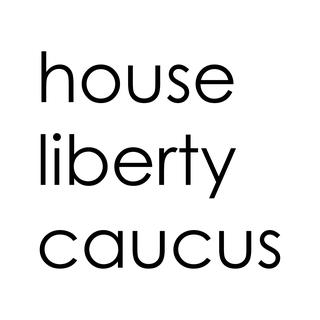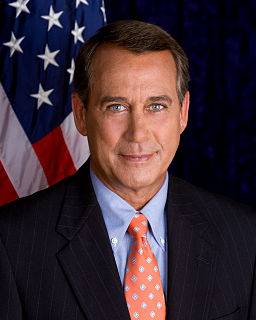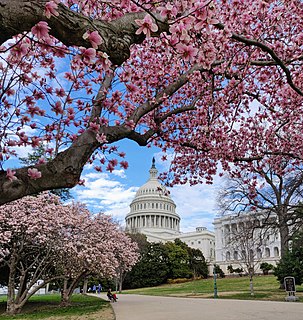
The 107th United States Congress was a meeting of the legislative branch of the United States federal government, composed of the United States Senate and the United States House of Representatives. It met in Washington, D.C. from January 3, 2001 to January 3, 2003, during the final weeks of the Clinton presidency and the first two years of the George W. Bush presidency. The apportionment of seats in this House of Representatives was based on the 1990 United States Census. The House of Representatives had a Republican majority, and the Senate switched majorities from Democratic to Republican and back to Democratic. By the end of term, Republicans had regained the majority in the Senate, but since the body was out of session reorganization was delayed till the next Congress.
In the United States, an interstate compact is a pact or agreement between two or more states, or between states and any foreign government. The Compact Clause of the United States Constitution provides that "No State shall, without the Consent of Congress,... enter into any Agreement or Compact with another State, or with a foreign Power,..."

The Congressional Progressive Caucus (CPC) is a congressional caucus affiliated with the Democratic Party in the United States Congress. The CPC represents the most left-leaning, progressive faction of the Democratic Party. It was founded in 1991 and has generally grown since then.

The 1992 United States House of Representatives elections coincided with the 1992 presidential election, in which Democrat Bill Clinton was elected as President, defeating Republican incumbent President George H. W. Bush.

The 1982 United States House of Representatives elections was an election for the United States House of Representatives held on November 2, 1982, in the middle of President Ronald Reagan's first term, whose popularity was sinking due to economic conditions under the 1982 recession. The President's Republican Party lost seats in the House, which could be viewed as a response to the President's approval at the time. Unlike most midterm election cycles, the number of seats lost—26 seats to the Democratic Party—was a comparatively large swap. It included most of the seats that had been gained the previous election, cementing the Democratic majority. Coincidentally, the number of seats the Democrats picked up (26), was the exact amount the Republicans would have needed to win the House majority.

The Republican Main Street Partnership is a 501(c)(4) organization that used to be allied with the similarly named Republican Main Street Caucus. According to the Partnership, its members advocate for "conservative, pragmatic government". The Partnership continues to exist, while the Caucus was dissolved by its members in February 2019.

The 115th United States Congress was a meeting of the legislative branch of the United States of America federal government, composed of the Senate and the House of Representatives. It met in Washington, D.C. from January 3, 2017, to January 3, 2019, during the final weeks of Barack Obama's presidency and the first two years of Donald Trump's presidency. The seats in the House were apportioned based on the 2010 United States Census.

The House Liberty Caucus is a congressional caucus consisting of conservative, libertarian and libertarian conservative members of the United States House of Representatives. It hosts a bimonthly luncheon in Washington, D.C. The group was founded by Rep. Justin Amash of Michigan and joined by Republican members who wanted to "focus on specific issues like economic freedom, individual liberty, and following the Constitution". During his time in Congress, the incumbent Governor of Colorado, Jared Polis, who served five terms as the United States Representative from Colorado's 2nd congressional district from 2009 to 2019, was the only Democratic member of the caucus. The caucus has also been characterized as "conservative with a libertarian emphasis" and associated with the Tea Party movement.

The 2012 United States House of Representatives elections were held on November 6, 2012. It coincided with the reelection of President Barack Obama. Elections were held for all 435 seats representing the 50 U.S. states and also for the delegates from the District of Columbia and five major U.S. territories. The winners of this election cycle served in the 113th United States Congress. This was the first congressional election using districts drawn up based on the 2010 United States Census.
The House Trade Working Group (HTWG) is an informal group of Congressmen in the U.S. House of Representatives that is made up of members that take a skeptical view of international trade agreements. The HTWG was formed by Congressman Mike Michaud and Congresswoman Linda Sánchez during the 110th Congress. Members of Congress from both parties and outside organizations, who represent American workers, consumers, and businesses, are active participants in the group. The HTWG organizes press conferences, briefings, letters, and other initiatives to fight trade agreements. As of the 111th Congress, the membership was as follows :

The 2014 United States House of Representatives elections were held on November 4, 2014, in the middle of President Barack Obama's second term in office. Elections were held for all 435 seats of the House of Representatives, representing the 50 states. Elections were also held for the non-voting delegates from the District of Columbia and four of the five territories. The winners of these elections served in the 114th United States Congress, with seats apportioned among the states based on the 2010 United States Census. The Republicans won 16 seats from Democrats, while three Republican-held seats turned Democratic. The Republicans achieved their largest majority in the House since 1928 due to a sizeable Republican wave. Combined with the Republican gains made in 2010, the total number of Democratic-held House seats lost under Barack Obama's presidency in midterm elections rose to 77 with these elections. This marked the highest number of House seats lost under a two-term president of the same party since Harry S. Truman. With 36.4% of eligible voters voting, the voter turnout was the lowest since 1942.

The 117th United States Congress is the next meeting of the legislative branch of the United States federal government, composed of the United States Senate and the United States House of Representatives. It is scheduled to meet in Washington, D.C., from January 3, 2021, to January 3, 2023, during the final weeks of Donald Trump's presidency and the first two years of Joe Biden's presidency.

The 2018 United States House of Representatives elections were held on November 6, 2018, with early voting taking place in some states in the weeks preceding that date. Voters chose representatives from all 435 congressional districts across each of the 50 U.S. states. Non-voting delegates from the District of Columbia and four of the five inhabited U.S. territories were also elected. These midterm elections took place nearly halfway through the 2016–2020 term of Republican President Donald Trump. On Election Day, Republicans had held a House majority since January 2011.

The 2020 United States House of Representatives elections were held on November 3, 2020, with special elections throughout the year. Elections were held to elect representatives from all 435 congressional districts across each of the 50 U.S. states, as well as six non-voting delegates from the District of Columbia and the inhabited U.S. territories. Numerous other federal, state, and local elections, including the 2020 presidential election and the 2020 Senate elections, were also held on this date. The winners of this election will serve in the 117th United States Congress, with seats apportioned among the states based on the 2010 United States Census. Democrats have held a majority in the House of Representatives since January 3, 2019, as a result of the 2018 elections, when they won 235 seats.
Mayors National Climate Action Agenda, or Climate Mayors, is an association of United States mayors with the stated goal of reducing greenhouse gas emissions. Founded by Los Angeles mayor Eric Garcetti, former Houston mayor Annise Parker, and former Philadelphia mayor Michael Nutter, the group represents 435 cities and nearly 20% of the U.S. population.
The Blue Collar Caucus is a United States Democratic Party congressional caucus that advocates for labor and working class priorities. It was founded in 2016 to focus the Democratic Party on blue-collar issues. The caucus supports increased infrastructure spending and opposes offshoring.













